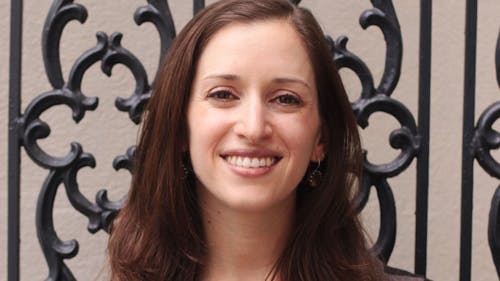Professor wins $623,035 for Latino study

Vikki Katz has been studying the low-income Latino population for over a decade, a population she became interested in because of its demographic importance and insufficient understanding from the public.
Katz, an assistant professor in the School of Communication and Information, spent a portion of her career researching the active roles of children in translating for their parents at home, school, health care facilities and social services and how they use media technology to help their families.
The Bill and Melinda Gates Foundation awarded her a $623,035 grant to fund her newest research project, which she said is in its planning stages.
“I’ve been interested in family dynamics related to technology use and learning for a long time, so for me, this is a logical and exciting extension of the work I’ve been doing in different locations,” she said.
The first year of the project includes interviewing 50 to 60 immigrant families in California, Arizona and Texas about how they are responding to national and local efforts to help them adopt new technology like iPads and tablets, she said.
Katz hopes to use the interviews to ascertain how these families reach decisions concerning new technology and how existing technology is used in the home, in what language and for what purposes.
“A lot of people have talked about how important being online and having access to technology and digital literacy are to young people and to families in terms of what kinds of opportunities are only available online,” she said.
Katz said researchers know little about how children, families and communities might vary in their opinions of what kinds of technology are useful for them.
“So rather than just presuming that these things are important and useful, trying to understand on people’s own terms, in the context of their own lives, how they might use these technologies and how they might be useful … [will help] to create programs that resonate with their experiences,” she said.
Children of Mexican immigrants are more likely than any other group to be living in poverty, she said. They are also more likely to have a parent who has less than an eighth grade education and who does not speak English.
“Mexican origin families are disproportionately likely to be experiencing [social inequality] in the most serious way, and that’s why the Gates Foundation was generous enough to fund this work because they want to understand the specific needs of this group,” she said.
Katz aims to get these families online with the hope that equal access to technology might mitigate social inequalities.
To do this, Katz said she would look at the similarities and differences among the families she interviews and present the results back to the families, school principles and administrators.
Katz said in the second year, she plans to develop a national survey of low-income families with questions related to technology adoption, learning and media use.
The survey should ultimately help technology providers, children’s program designers and policy makers to form ideas that address social inequality in technology, she said.
To make time for the traveling involved in the project, Katz said she would teach one course per semester instead of two for the duration of the project.
Katz teaches communication research, a class on family communication and a class on mediated communication theory in addition to a class that she is excited to teach this semester on children and media.
“[It’s] very much up my alley and very much related to this project,” she said.
Laurie Lewis, department chair for the School of Communication and Information, said in an email the entire department is proud of Katz.
“Her work in the area of technology access and use by Latino families is important,” Lewis said. “[It] represents the best of engaged scholarship that makes contributions to scholarship as well as to policy and community.”
Claire McInerney, acting dean of the School of Communication and Information, said as a professor, Katz is conscientious, creative and an achiever in teaching, scholarship and service.
This is one of the largest grants the Bill and Melinda Gates Foundation has ever awarded Rutgers, she said.
McInerney said Katz’s research is important for those who design communication and information tools and for policy makers.
“The implications for this research is that it might lead to an understanding of how technology can help the families cope, can help them in their everyday lives and in being able to have a quality of life that will help them now and in the future,” she said.
This grant is unusual, McInerney said, because in recent years, the Gates Foundation has funded research in areas like health and disease outside of the United States.
“So this grant is unusual, and it’s truly a testimony to her fine work and the confidence the foundation has in her and in her research,” she said.



